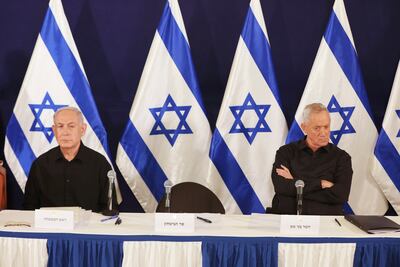Before Hamas and other militants launched their October 7 attack on Israel last year, the country seemed to be headed in an unknown direction. Government plans to overhaul the judicial system resulted in months of mass street protests and intense political polarisation. The issue sharpened the kind of existing divisions that saw Israeli voters go to the polls five times in four successive years.
October 7 changed all that. The deaths of more than 1,200 people and the kidnapping of hundreds more unified a shocked Israeli society, and the country’s political and military leaderships – in public at least – were as one about responding to the crisis, insisting that they would recover the hostages and restore deterrence. Nine months later, however, that unity has been replaced by confused messaging and cloudy thinking, leading many to ask the question: where is the country going?
The disarray among Israeli political and military leaders is now in plain sight. Yesterday, Israeli Prime Minister Benjamin Netanyahu disbanded the country’s war cabinet following the resignation of political opponent Benny Gantz over the latter’s claim that Mr Netanyahu had no post-war plan for Gaza. Mr Netanyahu has also found himself at loggerheads with the military, publicly criticising plans announced by the army on Sunday to hold daily tactical pauses in fighting along one of the main roads into Gaza to enable the delivery of aid.

Now, less than two weeks after a bloody Israeli raid on Nuseirat refugee camp led to the rescue of four hostages – at the cost of more than 200 Palestinian lives – the self-congratulation from that operation been replaced by now-familiar disharmony. This should concern all those who want to see an end to the war.
The news of “tactical pauses” in Gaza indicates that rather than a peace process or a "humanitarian pause", it is a development driven by Israeli military. This is worrying because military leaderships often see complex conflicts in terms of victory and defeat – and there is no victory to be had in Gaza. The deaths of at least 10 Israeli soldiers in the past few days shows that a stated goal of the war – the destruction of Hamas – remains unmet, despite months of unrestrained warfare and tens of thousands of civilian casualties. Confronted by this reality, Israel’s military is looking for a “win” to offset the fact that more than 100 hostages remain missing, the army continues to lose troops and Israel faces mounting international isolation.
Meanwhile, opposition from Mr Netanyahu and ultranationalist Israeli ministers to even very limited pauses in the fighting reveals not only a lack of internal cohesion, but a dispiriting fixation on the use of force to achieve the country’s aims. This fractious decision-making does not bode well for all those who want to see an end to the war and a plan to end the occupation; the region is seemingly confronted by an advanced military power whose leaders cannot agree and who seem to have little strategic or political direction.
There is, however, a way forward: Israeli forces cease fire and withdraw from Gaza; Hamas releases the remaining hostages and stops its attacks on Israel; the international community oversees the resumption of humanitarian aid to Gaza and pushes for a talks process that puts politics, not the gun, at the centre of efforts to end the ruinous occupation of Palestine. In a war that is becoming increasingly confusing and diffuse, these steps to end the violence should be clear to everyone.


